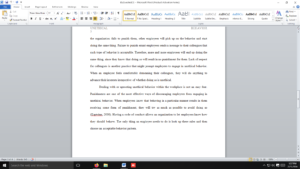Organizational systems
This week’s resources provide a great deal of information regarding the impact that organizational systems have on unethical behavior. For example, researchers note that rivalry can often increase unethical behaviors (Kilduff et al., 2016). This week, you will explain how an organization’s culture (e.g., systems and practices) can unknowingly or unintentionally increase unethical behavior among employees.
Assume you have been tasked with researching these concepts for your organization’s management team, who are concerned about possible cases of unethical behavior stemming from organizational systems in place. Prepare a professional business memo to share with managers at the next team meeting. Be sure to include the following in your memo:
- Explain the importance of organizational culture and codes of conduct in encouraging ethical behavior.
- Assess three organizational policies or practices, as found in the readings and outside research, which can increase unethical behavior among employees.
- Propose informal and formal system solutions to reduce unethical behavior in your organization. Explain the benefits of these system solutions, as well as possible implications for these solutions.
Support your memo with a minimum of three scholarly resources. In addition to these specified resources, other appropriate scholarly resources, including older articles, may be included.
Length: 1-2 pages, not including title and reference pages
Your memo should demonstrate thoughtful consideration of the ideas and concepts presented in the course by providing new thoughts and insights relating directly to this topic. Your response should reflect scholarly writing and current APA standards where appropriate.
Answer preview
Competitiveness is one of the practices that might push employees towards adopting unethical behavior (Kapteinn, 2008). When an employee works within an extremely competitive environment, they will try as much as possible to emerge as the best. Sometimes being the best at anything will require an employee to engage in unethical behavior. Even though organizations unknowingly encourage this type of behavior, it is up to them to eliminate it. To keep up with competitors, employees will do anything as long as it guarantees them that they will become better than their competitors. Another practice that might push employees towards engaging in unethical behavior within the working environment is the failure to punish employees that go against the company’s established patterns of behavior (Kapteinn, 2008). At times an organization’s management is culpable for allowing employees to engage in unethical behavior.
[545 Words]

Organizational systems


